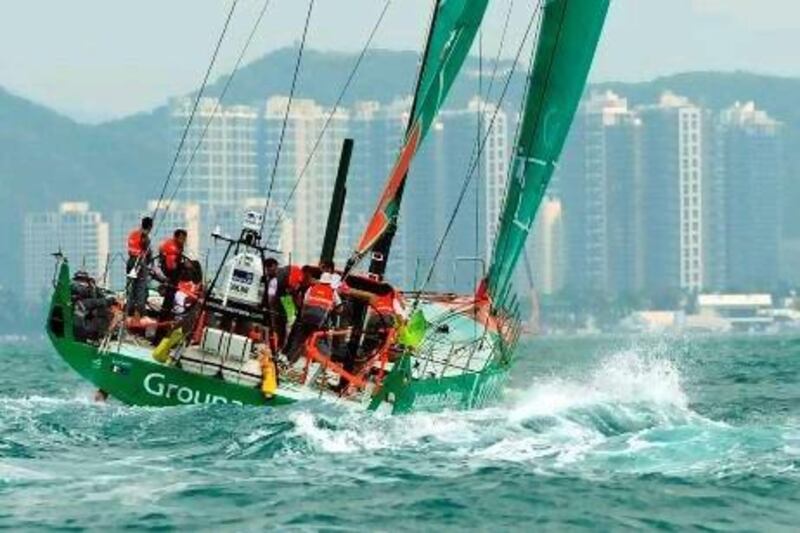Sometimes sport figures deserve smart-alecky disparagement for the decisions they take, and really, what fun. And sometimes they deserve commiseration for the decisions they must take, and really, how awkward.
Over here at the southernmost city of the People's Republic of China, we have the latter.
For a peek at the outlandishness of the decision Volvo Ocean Race chief executive Knut Frostad had to make concerning the start of Leg 4, get a load of Ian Walker's words on possible strategies.
"Like always in sailing, it will be obvious in one week's time what the right decision was," the Abu Dhabi Ocean Racing skipper said. "You could decide to not leave the harbour for two days, and everybody goes out, breaks their mast and sinks, and it could be a great decision."
When the plausible list of strategies includes Not Leave The Harbour For Two Days While Waiting For Opponents To Break Their Masts And Sink, you have one lousy situation.
On one side of the decision closing in around Frostad: the South China Sea forecast for a weather system threatening to the yachts. On another side: the need to begin for the sponsors counting upon it. On another side: the need to get to Auckland in time for a truncated stopover that might last only 12 days or so. On another side: the dearth of shipping possibilities should a boat or two break.
From the proverbial ceiling: the lack of geographic alternatives for getting through the Strait of Luzon and out into the Pacific Ocean.
From his squeeze, he and fellow organisers squeezed out an alternative: a faux start, then a return to harbour for the night, then an in-earnest start, possibly in darkness. Is it clunky? Sure. Is it an accident at the intersection of sport and business? Yes.
Can you think of a decisively better idea? No.
For a second peek at the scenario were the boats to venture right on out into the winds of 40 knots plus gusts and the waves of eight metres plus that one brutal metre of surf at the top, listen to Craig Satterthwaite's assessments.
Abu Dhabi's most seasoned Volvo Ocean Race sailor, the 38-year-old Kiwi does not belong anywhere near any convention of whiners. He is as tough as 10 of most people. He readily said of the prospect of heading on out: "We've pretty much known about it for two years," since the announcement of the course. "You know you're going to get [a kicking]. It's not a surprise. Mentally you prepare for it and if it doesn't happen, that's a bonus."
OK, got that, so then, this: "We're not going downwind. That's the problem. A big problem."
And this: "I really don't know how to emotionally describe it but it'll be violent, with huge crashes. A 14-ton boat, it's going to make a lot of noise. Look at ships and see how the ships are dented, and it gives you an idea of the force of the water."
And this: "Up to 50 kilometres per hour. Try standing in front of that. That's the approach speed of the wave."
Survival mode and boat-babysitting might be part of going around the world but is not necessarily what you would call sport.
So with boat breakage tilted beyond possibility and into likelihood, a third peek at Frostad's dilemma comes from the Puma skipper Ken Read's peek back at January 2009, at the atrocious Leg 4 from Singapore to Qingdao, the one with the three withdrawals, the six damaged boats out of seven, the multiple injuries and the two boats (including Read's) hiding in Philippines coves.
"To be honest, it wasn't a race anymore, it was just kind of surviving, to get to Qingdao," Read said. "To me that's the big question: 'Are we racing or are we surviving?' That's a big decision the skipper has to make."
Leg 4 last time was "the most bizarre race I've ever been in in my life", he said. Bizarre: They anchored near the Philippines for eight hours, spent half the leg without a boom (which broke) yet came in second, merely 20 minutes behind the winning Telefonica Blue, which entered Qingdao with eight active sailors.
All of that and the Philippines cove, which Read called "one of the most interesting five hours of my sailing career". Those five hours included "an unbelievable sleep, three hours of the most unbelievable sleep I've ever had in my life".
And therein lay another wall for a chief executive pondering a fleet with worse weather this time: the lack of viable coves for sleeping unbelievably.





